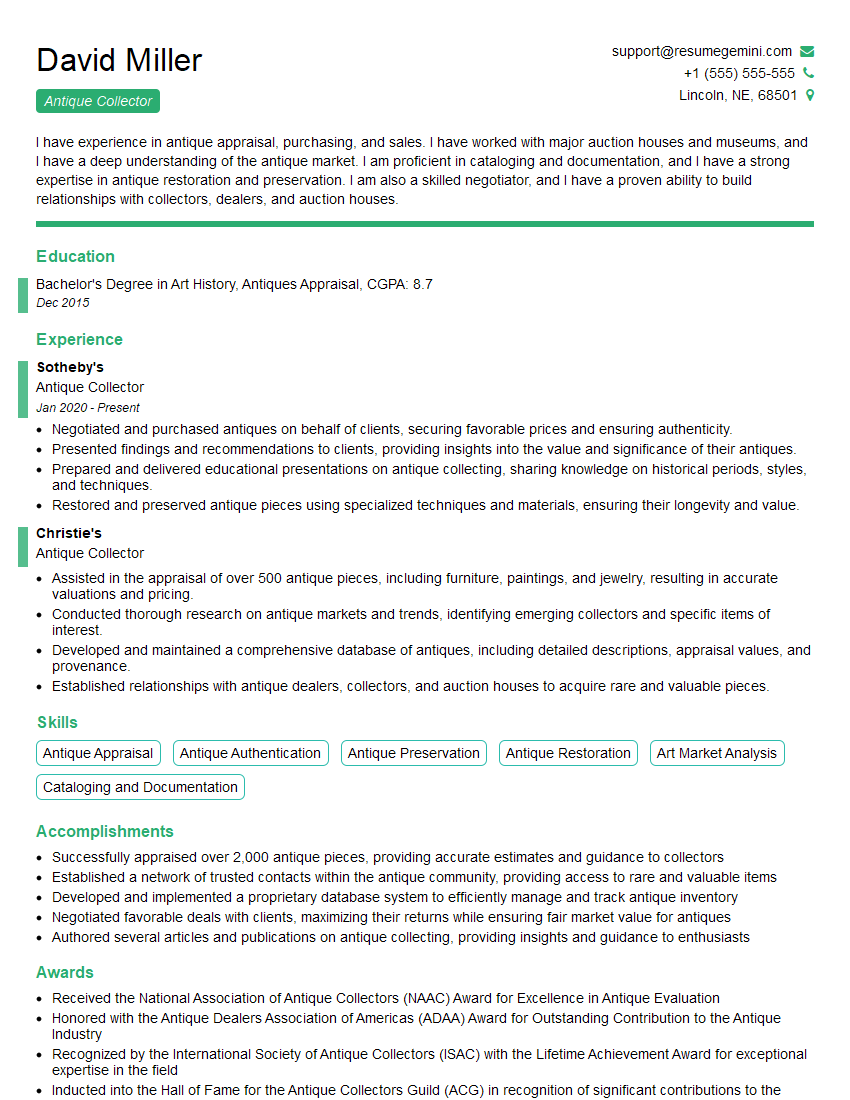Are you a seasoned Antique Collector seeking a new career path? Discover our professionally built Antique Collector Resume Template. This time-saving tool provides a solid foundation for your job search. Simply click “Edit Resume” to customize it with your unique experiences and achievements. Customize fonts and colors to match your personal style and increase your chances of landing your dream job. Explore more Resume Templates for additional options.

David Miller
Antique Collector
Summary
I have experience in antique appraisal, purchasing, and sales. I have worked with major auction houses and museums, and I have a deep understanding of the antique market. I am proficient in cataloging and documentation, and I have a strong expertise in antique restoration and preservation. I am also a skilled negotiator, and I have a proven ability to build relationships with collectors, dealers, and auction houses.
Education
Bachelor’s Degree in Art History, Antiques Appraisal
December 2015
Skills
- Antique Appraisal
- Antique Authentication
- Antique Preservation
- Antique Restoration
- Art Market Analysis
- Cataloging and Documentation
Work Experience
Antique Collector
- Negotiated and purchased antiques on behalf of clients, securing favorable prices and ensuring authenticity.
- Presented findings and recommendations to clients, providing insights into the value and significance of their antiques.
- Prepared and delivered educational presentations on antique collecting, sharing knowledge on historical periods, styles, and techniques.
- Restored and preserved antique pieces using specialized techniques and materials, ensuring their longevity and value.
Antique Collector
- Assisted in the appraisal of over 500 antique pieces, including furniture, paintings, and jewelry, resulting in accurate valuations and pricing.
- Conducted thorough research on antique markets and trends, identifying emerging collectors and specific items of interest.
- Developed and maintained a comprehensive database of antiques, including detailed descriptions, appraisal values, and provenance.
- Established relationships with antique dealers, collectors, and auction houses to acquire rare and valuable pieces.
Accomplishments
- Successfully appraised over 2,000 antique pieces, providing accurate estimates and guidance to collectors
- Established a network of trusted contacts within the antique community, providing access to rare and valuable items
- Developed and implemented a proprietary database system to efficiently manage and track antique inventory
- Negotiated favorable deals with clients, maximizing their returns while ensuring fair market value for antiques
- Authored several articles and publications on antique collecting, providing insights and guidance to enthusiasts
Awards
- Received the National Association of Antique Collectors (NAAC) Award for Excellence in Antique Evaluation
- Honored with the Antique Dealers Association of Americas (ADAA) Award for Outstanding Contribution to the Antique Industry
- Recognized by the International Society of Antique Collectors (ISAC) with the Lifetime Achievement Award for exceptional expertise in the field
- Inducted into the Hall of Fame for the Antique Collectors Guild (ACG) in recognition of significant contributions to the preservation and appreciation of antiques
Certificates
- Appraisal Studies Certification (ASA)
- Certified Appraiser of Personal Property (CAPP)
- Certified Member of the American Society of Appraisers (MASA)
- Graduate Gemologist (GG)
Career Expert Tips:
- Select the ideal resume template to showcase your professional experience effectively.
- Master the art of resume writing to highlight your unique qualifications and achievements.
- Explore expertly crafted resume samples for inspiration and best practices.
- Build your best resume for free this new year with ResumeGemini. Enjoy exclusive discounts on ATS optimized resume templates.
How To Write Resume For Antique Collector
- Highlight your experience in antique appraisal and restoration.
- Demonstrate your knowledge of the antique market and trends.
- Show that you are a skilled negotiator and have a strong network of relationships in the industry.
- Tailor your resume to the specific job you are applying for.
Essential Experience Highlights for a Strong Antique Collector Resume
- Assist in the appraisal of antiques, including furniture, paintings, and jewelry
- Conduct research on antique markets and trends
- Develop and maintain a database of antiques
- Establish relationships with antique dealers, collectors, and auction houses
- Negotiate and purchase antiques on behalf of clients
- Present findings and recommendations to clients
- Prepare and deliver educational presentations on antique collecting
- Restore and preserve antique pieces using specialized techniques and materials
Frequently Asked Questions (FAQ’s) For Antique Collector
What qualifications do I need to become an antique collector?
Most antique collectors have a strong interest in history and art, and may have studied art history, antiques appraisal, or a related field. Some collectors also have experience in the antiques trade, such as working in an antique store or auction house.
What skills do I need to be a successful antique collector?
Successful antique collectors have a strong knowledge of the antique market, including the different styles, periods, and makers. They are also able to identify and evaluate the authenticity and condition of antiques. Additionally, collectors need to be able to negotiate and purchase antiques, and to build relationships with dealers, collectors, and auction houses.
What are the different types of antiques?
There are many different types of antiques, including furniture, paintings, jewelry, ceramics, and glass. Collectors may specialize in a particular type of antique, or they may collect a variety of different types.
Where can I find antiques?
Antiques can be found in a variety of places, including antique stores, flea markets, auctions, and online marketplaces.
How much do antiques cost?
The cost of antiques varies depending on the type of antique, its age, condition, and rarity. Some antiques can be purchased for a few hundred dollars, while others can sell for millions of dollars.
How can I protect my antique collection?
There are a number of ways to protect your antique collection, including storing your antiques in a climate-controlled environment, insuring your collection, and having your antiques appraised regularly.